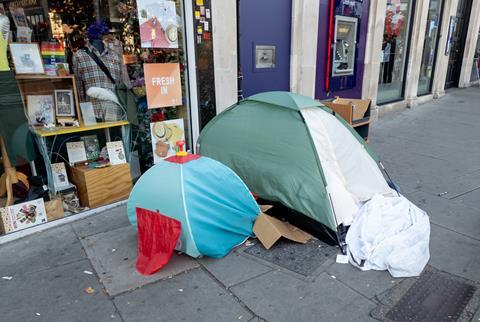Total spending on homelessness to rise to £1bn in 2025/26
The chancellor Rachel Reeves today committed an additional £230 million in funding to address homelessness and rough sleeping in the Labour government’s first budget.

This will bring total spending on tackling homelessness in 2025/26 up to £1bn.
The latest statistics from the Ministry of Housing, Communities and Local Government revealed that homeless households are at a record high, exceeding 320,000 at 31 March 2024, and representing an 8% increase from the previous year.
The government will also allocate £1bn from next year to extend the Household Support Fund in England and to provide discretionary housing payments (DHPs) in England and Wales.
Introduced by the previous government in October 2021 in response to the cost-of-living crisis, the Household Support Fund provides aid to households struggling with essential living costs, such as food, energy, and water bills.
DHPs are payments made by local councils to help people who need extra financial assistance with their housing costs.
On debt, the government will introduce a new fair repayment rate to reduce the level of debt repayments that can be taken from a household’s Universal Credit payment each month from 25% to 15% of the standard allowance.
Reeves said this will help 1.2 million of the poorest households keep more of their award each month and will lift children out of poverty. Those who benefit will gain an average of £420 a year.
The settlement also provides additional funding to boost the uptake of pension credit and support efforts to combine pension credit and housing benefit for new claimants starting in 2026. By increasing pension credit uptake, those who are eligible will also qualify for Winter Fuel Payments.
Although the additional investment in homelessness and rough sleeping, and the £500m boost to the Affordable Homes Programme has been welcomed, sector experts have voiced disappointment that the Local Housing Allowance still remains frozen.
LHA is the rate used to calculate housing benefit for renters in the private sector in the UK. It has been frozen since 2020. However, in Jeremy Hunt’s spring statement in April this year, he announced that the LHA rate would be restored to cover the 30th percentile of homes available on the private-rented market.
More on the Autumn Budget 2024:
>> Budget hits employers as Reeves raises taxes by £40bn
>> Reeves announces £3bn in guarantees for SME housebuilders and confirms £500m AHP top-up
>> Budget reaction round-up: AHP top-up ‘welcome’ but ‘nowhere near enough’ to meet demand
According to the Joseph Rowntree Foundation, the freeze on LHA will push 80,000 private renters on housing benefit, including 30,000 children into deep poverty.
In a post on X, Paul Kissack, the chief executive of Joseph Rowntree Foundation called the decision to keep LHA frozen “really disappointing”.
The government also reconfirmed a proposed five-year social housing rent settlement of Consumer Price Inflation + 1% and has launched a consultation on this proposal today. The five-year settlement would run from 1 April 2026 to 31 March 2031.
The consultation paper says that the government is also seeking views on possible variations to this approach that could potentially improve the stability of rent policy, such as confirming our policy for a longer period such as 10 years or on a rolling basis
Key measures
- £3bn of additional support for SMEs and the Build to Rent sector, in the form of housing guarantee schemes.
- Housing budget to be £5bn in 2025/26.
- Increase the stamp duty land tax surcharge on second homes by two percentage points to 5%. Reeves says this will support over 130,000 additional transactions from people buying their first home or moving home over the next five years.
- As announced at the weekend – a £500m ‘top-up’ to the Affordable Homes Programme to build up to 5,000 additional affordable homes.
- A consultation on a new long-term social housing rent settlement of CPI+1% for 5 years.
- Investment in remediation will rise to over £1bn in 2025-26. This includes new investment to speed up remediation of social housing. The government will set out further steps on remediation later this autumn.
- Reduced discounts on the Right to Buy scheme and councils in England enabled keep all the receipts generated by sales.
- Additional £1bn from next year to extend the household support fund and discretionary housing payments “to help those facing financial hardship”.
- An initial £3.4m to ‘kick-start’ the government’s Warm Homes Plan to decarbonise homes. This includes £1.8bn to support fuel poverty schemes, helping over 225,000 households reduce their energy bills by over £200.
- £46m of additional funding to support recruitment and training of 300 graduates and apprentices into local planning authorities, accelerate large sites that are stuck in the system, and boost and upskill local planning authority capacity.
- £56m to unlock 2,000 homes at Liverpool Central Docks.
- £25m in a joint venture to deliver 3,000 energy-efficient homes across the country, 100% of which are targeted for affordbale tenures.
- £47m to support the deliver of 28,000 homes stalled due to nutrient neutrality rules.
- Pledge to increase funding for the Boiler Upgrade Scheme in England and Wales this year and next, following the high demand for the scheme. The government is also providing funding to grow the heat pump manufacturing supply chains in the UK to support the plan.










No comments yet